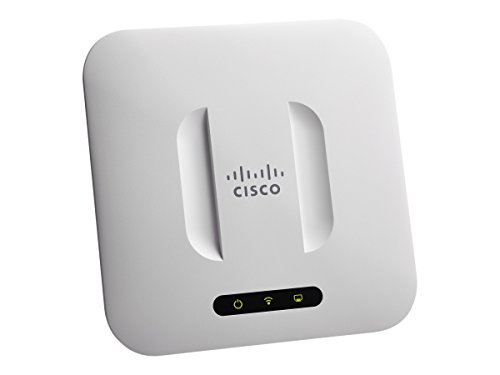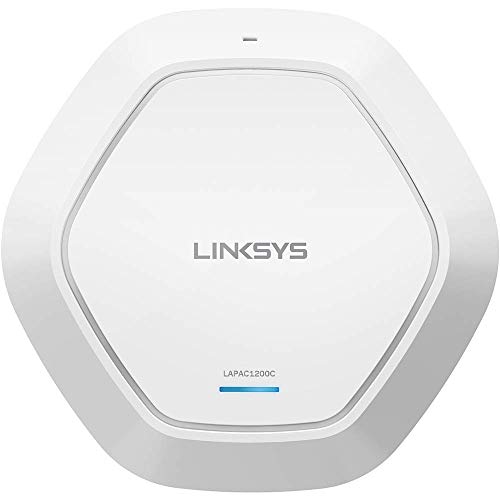- Wireless access point are key to have a robust wireless network for the businesses
- Business APs allow you to manage your wifi efficiently with strong security and easy roll out
- We explain what is the key business functionality the wireless access points offer, and their advantages and disadvantages
- In this article we tested 4 main business-grade wireless access point from main manufacturers to give our top pick
- Also, learn more about what is wireless access point and best wireless access point
Our Pick
Ubiquiti AP-Pro
Best Business Access Point
Sophisticated access point for business with enterprise-level network features at the reasonable price tag. It come with easy mounting features and well-design software [more details]
$219.00 on AmazonWhy Businesses Should Use Access Points
There are five main reasons why wifi access points should become a standard for small and medium businesses:
- Wi-Fi access points have a wider and broader transmission range
- They have bandwidth to provide access to more users, compared to routers
- They are more capable and have stronger signals for sending and receiving data
- APs are safer for business environments than routers
- They are flexible and makes complex networks easy to manage
What is A Business Access Point?
It’s true that all businesses need a router to implement their network infrastructure. However, the need for an access point cannot be overemphasized, especially in a large network topology. An access point provides wireless access to the network. That’s the main feature of all access points.
One of the benefits of using access points in your business is extensive coverage. They have wider and broader transmission routes and provides more user access than routers. And are better in terms of safety of the users than routers.
Moreover, access points are easy to secure. Once you’ve enabled WPA encryption, secured your AP admin interface, restrict SSID (Service Set Interface) broadcasting, and used MAC filtering for access control, you have a well secured network.
Also, access points are easier to manage than routers. Adding a few to your network is simple and only require a few steps. In fact, there are now a lot of controller-based access points that lets you manage everything from a single location. And businesses with extensive wireless networks can now use cloud solutions for managing and controlling all of their access points.
What are the main Access Point functionalities for business?
There are a few things that access points can bring to your business in terms of scalability and efficiency. These functionalities can be summarized as follow:
- Scalability: Access points are efficient for modern businesses because it can handle multiple connections at a time. This can make it extremely easy for businesses to expand their network at any given time. It also allows businesses to provide an excellent connection for their employees/users such as roaming freely without experiencing any interruption in the network. Even when clients on the network switch between networks, the connection doesn’t skip or drop, which is good for productivity.
- Multi-faceted interface: APs are not limited to connecting to a handful of networking devices. Rather, they can connect to a wide range of devices including mobile phones, PCs, laptops, Wi-Fi cameras, printers, and a host of other devices. This means you won’t have a shortage of devices you can connect to the network, thus creating a smooth an efficient workplace for small and medium scale businesses.
- Broad Range of Transmission: A wireless router can be a useful addition to a business. However, it can only cover a limited area, which may not be suitable for large businesses with a network spanning across dozens of buildings. Therefore, such applications need an extensive coverage range, which can only be provided by an access point. For large businesses, an access point is far better than a router.
Disadvantages of using APs
There are a lot of advantages to using access points. But so do the disadvantages. Now that you know some of the features of access points and how businesses can benefit from them, you need to know some of the drawbacks so you can prepare for them.
1. APs are costly. Setting up access points in a network can be an expensive undertaking, especially for large businesses. The more extensive the network gets, the more access points will be needed to facilitate optimal network functionality. Although they are easy to set up, the cost of running them may be high. The more APs exist in a network, the further the need to up the overall security.
2. Access Points are secure but needs to be setup properly. When properly setup, access points are secure and that’s why a lot of businesses use them. But to ensure they’re immune to attacks, they need to be configured properly. Some access points even come with internal security but might be more expensive. To ensure you get the most, you may want to opt for those with “wireless intrusion protection”. You’ll pay more but you’ll have peace of mind.
3. Overlapping channel problem is common. This is a common phenomenon among large businesses with lots of APs across their network topology. These access points are utilized simultaneous, which without proper configuration, makes managing the overlapping channel problem difficult to manage.
Best Access Point Brands for Business
Cisco Wireless Access Points
When it comes to the manufacturing of networking devices, there are dozens of brands to choose from. However, only a few are worth looking into because of their reputable, quality standard, and continuous innovation. One of these companies is Cisco.
While Cisco is known for more than just making networking devices, they’re a force to reckon with when it comes to wireless access point points. Although Cisco is focused on the higher end of the market spectrum, they have a few dozen basic devices for the average consumer. For bigger companies and businesses looking for enterprise solutions, Cisco is one of the brands to consider.
If you can afford their business access points, then you should consider then above other brands because of the quality of their products. Ubiquiti is a close competitor but they both produce some of the best in the industry. As you’ll soon learn in the subsequent part of this guide, the CISCO SYSTEMS 802.11ac Wireless Access Point is one of the best access points for businesses you can consider. It’s unique, durable, and comes with the latest technologies to help businesses take their network capacity to the next level.
Unifi Wireless Access Points
There is no other brand that compares favorably and competes effectively with Cisco more than Unifi. Not just in terms of price but also scalability, management, design, and deployment. They’ve become one of the most trusted brands for businesses looking for the high-grade gears to implement their Wi-Fi. This is done by winning on many fronts.
One of the essential quality of Unifi products is the affordability option. They produce inexpensive gears for the average consumer as well as enterprise clients, which allows their product to be disruptive and able to capture a larger section of the market compared to the longstanding Cisco. Another great feature of their product is the ease of managing. Unlike Cisco, Unifi/Ubiquiti’s product doesn’t always come with a lot of ambiguities, especially during installation. With a straightforward approach, many businesses prefer their product since they wouldn’t need to expend too many resources in installing and managing it.
One of the major concerns in the industry is the extra charge or software fees that consumers and businesses face after purchasing their networking gear. To stop this, the company provides the UniFi Controller for free on all their hardware. This makes the cost of buying and setting up access points and other devices cheaper.
So, if your business network needs scaling and you want to add new access points to the mix, Unifi is an excellent brand to consider.
Best Wireless Access Point for Business: Ubiquiti AP-Pro
- Broad range of transmission (11b/g/n enterprise)
- Low noise level (23dBm)
- Wall/Ceiling mounts kits included
- 48V 0.5A PoE Adapter
WHAT WE LIKED
- Affordable
- It’s lightweight
- Good construction with a nice look
- Features LED lights for the device status
- Operates outside of a controller
- Robust and encompassing software management
WHAT WE DIDN’T LIKE
- The installation requires expert knowledge
This enterprise Wi-Fi system is the best access point for business. Not just because of its price but the generous features on it. It’s on the 802.11 ac standard, features the MU-MIMO technology, and comes with both PoE+ and injector and a weatherproof design that many other models lack.
The Ubiquiti UniFi AP-Pro comes with all of the necessary mounting accessories so you can install it quickly and effortlessly. And you get the option of installing it as a standalone install or controller-based. Compared to others, this makes for easier management too as those who are using it as a standalone install don’t have to bother with the software.
It comes with a USB 2.0 Port, this makes it easy to connect to a PA system so you can enjoy the smooth scalability it offers. When it comes to setting up though, this might need a professional hand as the installation is quite technical.
It’s equally designed well and robust, compared to other brand models. Its aesthetic look also makes it a good match for any home. Not just because of the unique, smoke detector look alike but also because of the blue light from the ring top. The device is weatherproof too, so it can both be used indoor or outdoor. So, if you’re looking for a well-rounded device for your business, look no further than the Ubiquiti UniFi Enterprise Wi-Fi System AP-Pro.
Expert Review
If you’re looking for a sophisticated access point for business that can handle enterprise network while allowing for unlimited scalability, you should consider this model. While the installation is technical, it can easily be outsourced to a professional who can handle all the intricacies of the setup process. Finally, a great many are attracted to this because of the reasonable price tag for such an extensive feature.
Alternative Top Business Access Points
Best Wireless AP for Small Business: Ubiquiti UniFi AC Lite AP
The Ubiquiti UniFi AC Lite AP is the lighter version of the Ubiquiti UniFi Wi-Fi System AP-Pro It’s not as robust and doesn’t have as much power on the 2.4 GHz band but same power on the 5 GHz band as the PRO version. This one is suitable for small businesses because of the lightweight and portable design.
Compared to all other UniFi devices, this seems to be the smallest with a diameter of 16 centimeters and 3-centimeter height so it can go into most locations in a building. The unit has a LED light on the top, indicating the status of the device. This can be used to identify a specific device out of a bundle of others, which makes managing multiple APs easier. If you don’t need this function, you can turn it off.
In terms of performance, it’s one of the powerful UniFi devices you can get your hand on. It features a dual-band gigabit with up to 300 Mbps transfer rates on the 2.4 GHz band and up to 867 Mbps on the 5 GHz band. It supports PoE (Power over Ethernet) and you can power it off a compatible networking device or use the enclosed PoE injector.
If you’re looking for a more robust access point, the Ubiquiti UniFi Enterprise Wi-Fi System AP-Pro is better. It’s bigger, has more power, and can be installed outdoors. But if you want something smaller and suitable for indoor use, then go for the Lite AP. In terms of price, the PRO version competes favorably as it’s not too expensive.
Best Cisco Wireless Access Point for Business Cisco 802.11ac Wireless Access Point
- 802.11ac wireless connectivity
- Gigabit Ethernet LAN interface with Power over Ethernet (PoE)
- Highly secure Captive portal
- Operating temperature: 0° to 40°C (32° to 104°F)
One of the reliable access points for businesses right now is the Cisco Systems 802.11ac AP. If you’re looking for an AP that’s not just easy to set up but also manage in an environment that lacks controller, then this is a good option for you. Many other access points need access points to deploy wireless clients and manage other devices connected to it. However, this can become a burden when you don’t have a controller. Without this controller, however, you can deploy multiple access points for your network while also using the web-based configuration and wizard to manage all of them in one location.
This model comes with PoE+ as well the PoE power injector so you can use any method that’s easiest for your company. Moreover, it supports the 802.11/at standard, which ensures high-speed internet compared to previous versions.
In terms of price, however, it’s a bit more expensive than the Ubiquiti UniFi Enterprise Wi-Fi System AP-Pro. While they both come from reputable manufacturers and with similar performance, the UniFi wins based on affordability. So, if you are working with a budget, you may want to consider the Ubiquiti UniFi Enterprise Wi-Fi System AP-Pro.
Best Business-grade wireless access Point: Linksys AC1200
- Cloud Manager – centralized browser based dashboard
- Dual band (2.4 gigahertz + 5 gigahertz) data transfer speeds up to 1.17 Gigabits per second
- PoE+ (Power over Ethernet Plus) compatible for streamlined installation
- Zero touch provisioning (configuration) allows for rapid deployment
The Linksys AC1200 Wireless Access Point for Business is a strong contender among business-grade access points. If you’re looking for faster speed and high-density performance for your everyday business, you need an access point as powerful as this model. This uniquely designed access point from Linksys comes with wider 80MHz channels which ensure you get greater data bandwidth when you operate in the 5 GHz band base. As a result of this, wireless clients on your network are going to experience faster internet speeds, thus boosting their performance and productivity.
It also supports 802.11ac technology, which can provide better data rates compared to the 802.11n standard. It also supports up to 1750 Mbps data rates, so your business is online at critical business periods. To ensure you get maximum security and customization without compromising network coverage, it offers the Captive Portal, which helps in security your company’s assets and resources from unauthorized access. It includes a guest access page too, so you can customize and manage who has access to the wireless network.
Finally, it offers a centralized network management portal where you can deploy, manage, and secure the entire network from just one location. Thus, if you’re looking for a reasonably priced unit that combines performance with security, you should check this out.
Frequenly Asked Questions
Should I choose Wi-Fi router, access point or Wi-Fi extender for my business?
When you’re running a business dependent on a good Wi-Fi network setup, you need to get all the devices in the network properly setup. And before you can do that, you need to fully understand what each of the devices in the network does. If you don’t, it may be difficult to make them work properly.
For this, it’s good to know how your Wi-Fi router differs from the Wi-Fi extender or access point.
First, the router. It’s considered an intelligent device because of the functions it performs. A router is basically a networking device that dispatches information between two devices. It takes the data coming from a port and transfers it to another connected device. It’s capable of overtaking this data and modifying it, before transferring between the devices. Also, a router does not deal with a wireless connection as opposed to a wireless access point. While some routers now have this feature, many others lack it.
An access point, on the other hand, provides wireless access to the network. That’s the main feature of all access points. This device acts very much like a hub in that data only passes through it. So, its job is to send everything that comes through from the wired device to a wireless device. Also, some people confuse the access point with the router, but they are different. An access point does not provide the functions of a router.
As for a network repeater, it’s a networking device that receives and resends incoming signals through physical media like Ethernet. Repeaters attempt to preserve signal integrity of the network and extend the distance over which data can safely travel. The ideal way of using it is to place it where the Wi-Fi signal is strong and is close to the weakest reception area.
Where to install access points?
To get maximum coverage, you should install your AP in a strategic location in the building you want to use it. Also, the size and the needs of your business will determine where and how many access points you install in a building. This is true for both small, medium, and large-size business organizations.
There are some other things to keep in mind when choosing a location for your access point. And that is dependent on the model of the access point and the radio waves. Although radio waves can travel through walls, they can become weak or not strong enough (especially if the wall is thick) as one that’s installed in a free location. So, if you can, install in a location where it’s not blocked by a wall or behind a wall.
You have to also determine where the Wi-Fi will be needed the most. While this is obvious, it can easily be overlooked. Once you determine this location, install your access in that area or as close as possible.
Another important thing to take care of is the manufacturer’s instructions. It’s best to mount your AP according to the user manual since this might affect not just the performance but also the operational life of the device.
What are unique access points for business?
There are a few things that your access point should have so you can enjoy optimal network signal and performance.
1. MU-MIMO Support
MI-MIMO stands for Multi Input Multiple Out. Many of the old access points are Wave 1 devices, which means they only support Single User MIMO (SU-MIMO). This means they have a single communication phase so there can only be a linear conversation between different devices on the network. Those devices that support MI-MIMO have a composite communication so different wireless clients can converse at the same time. In SU-MIMO, the access point can only communicate with just one wireless device. But in MI-MIMO, the AP can interface with many devices simultaneously.
2. Wireless Network Protection
A wireless network is very important in any setup. Although you may already have a firewall in place, an AP with wireless intrusion protection can reinforce your network security. It should be noted that it’s not all access points that come with wireless intrusion protection. Fortunately, more vendors are seeing the usefulness of this and are beginning to add it to their devices. This function allows APs to detect outside clients and other unapproved access points and block them from infiltrating the network. This is something you should consider when adding new APs to your network.
3. Antenna Options
As is common in areas where Wi-Fi network is deployed, there is always the need for a good selection of antenna options. In the event you need to migrate to a new infrastructure, it’ll be easy to adjust without having to alter the previous settings.
Last update on 2024-04-28 / Affiliate links / Images from Amazon Product Advertising API




